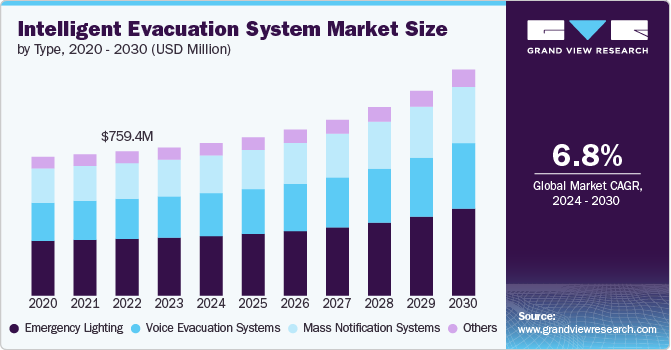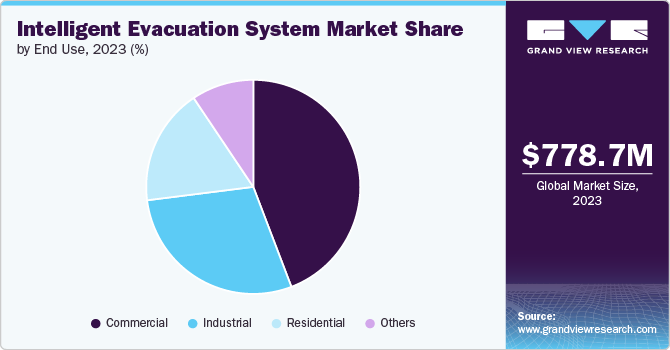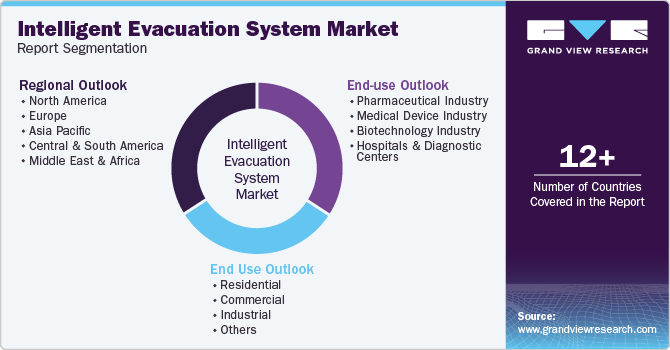
Intelligent Evacuation System Market Size, Share & Trends Analysis Report By Type, By End Use (Residential, Commercial, Industrial), By Region, And Segment Forecasts, 2024 - 2030
- Report ID: GVR-4-68040-466-8
- Number of Report Pages: 130
- Format: PDF
- Historical Range: 2018 - 2022
- Forecast Period: 2024 - 2030
- Industry: Technology
Intelligent Evacuation System Market Trends
The global intelligent evacuation system market was estimated at USD 778.7 million in 2023 and is projected to grow at a CAGR of 6.8% from 2024 to 2030. The increasing awareness of safety, driven by past emergencies and growing concern for well-being, significantly fuels the demand for intelligent evacuation systems. In recent years, high-profile incidents such as large-scale fires, natural disasters, and industrial accidents have highlighted the critical importance of effective evacuation strategies. These events underscore the necessity of having well-designed systems to ensure that people can exit buildings safely and efficiently during emergencies.

As awareness of these risks grows, individuals and organizations are more proactive about implementing safety measures. This heightened awareness is particularly evident in sectors where the safety of large groups of people is paramount. For instance, educational institutions, healthcare facilities, commercial centers, and public spaces are increasingly adopting advanced evacuation systems to protect occupants and comply with evolving safety standards.
The technological advancements in intelligent evacuation systems fuel the market growth. Innovations such as Internet of Things (IoT) integration, real-time monitoring, automated control systems, and smart sensors have made evacuation systems more effective and user-friendly. Modern evacuation systems can dynamically guide people based on real-time data, such as the location of fires or blocked exits, improving the safety and efficiency of emergency responses. Moreover, cloud-based solutions and AI-driven systems are enhancing the coordination and operation of these systems, especially in large, complex buildings.
The growing trend of smart buildings also drives the demand for intelligent evacuation systems. As buildings become more interconnected and automated, there is a need for smart safety systems that can communicate with other building systems, such as fire alarms, HVAC systems, and security systems. Intelligent evacuation solutions can be integrated into these smart environments, allowing real-time communication, automated responses, and data-driven evacuation routes.
Despite advancements, the complexity of integrating intelligent evacuation systems with existing building infrastructure restrains the market's growth. Many buildings, especially older ones, were not designed with modern evacuation technologies in mind. Retrofitting these systems involves planning and modifying electrical systems, communication networks, and emergency protocols. The complexity of integration can lead to increased costs and extended implementation timelines, which may discourage some property owners and managers from adopting these systems.
Type Insights
Based on type, the emergency lighting segment led the market with the largest revenue share of 39.16% in 2023. Rapid urbanization and infrastructure development worldwide are fueling the demand for emergency lighting systems. As cities expand and new commercial and residential buildings are constructed, there is a growing need for advanced safety systems, including emergency lighting. New construction projects are often required to integrate these systems as part of their design, contributing to the market’s expansion.
The voice evacuation systems segment is projected to grow at a significant CAGR from 2024 to 2030. The demand for voice evacuation systems is growing due to their ability to communicate clearly and concisely in complex environments. In large buildings such as airports, shopping malls, hospitals, and office complexes, traditional alarm systems might not be sufficient to convey detailed evacuation instructions. Voice evacuation systems address this need by broadcasting live or pre-recorded messages that guide occupants to safety, helping to reduce confusion and panic during emergencies.
End Use Insights
Based on end use, the commercial segment led the market with the largest revenue share of 44.2% in 2023. The increasing demand for automation in industrial operations drives the market's growth. The increasing focus on safety and risk management in commercial properties drives the demand for intelligent evacuation systems. As businesses and property managers become more aware of potential risks and vulnerabilities, there is a greater emphasis on implementing comprehensive safety solutions. Intelligent evacuation systems help manage emergencies more effectively and contribute to a proactive approach to risk management.

The residential segment is projected to grow at a significant CAGR from 2024 to 2030. The rise in multi-family and high-density residential housing contributes to the growth of intelligent evacuation systems. The complexity of managing evacuations during emergencies increases in apartment buildings, condominiums, and high-rise structures. Intelligent evacuation systems offer particularly beneficial features in these environments, such as coordinated emergency alerts and clear evacuation instructions for multiple residents.
Regional Insights
North American dominated the intelligent evacuation system market with the largest revenue share of 33.1% in 2023. The trend toward smart building technologies in North America drives the market's growth. Buildings in the region are increasingly adopting smart technologies that integrate various systems, such as lighting, security, and climate control. Intelligent evacuation systems that integrate seamlessly with these smart technologies enhance functionality and efficiency, making them a desirable choice for modern building projects.
U.S. Intelligent Evacuation System Market Trends
The intelligent evacuation system market in U.S.is expected to grow at a significant CAGR from 2024 to 2030. The heightened awareness of safety and emergency preparedness in the U.S. drives the market's growth. High-profile incidents and disasters have heightened public and organizational focus on effective emergency response. This increased awareness has led to a proactive approach to safety, with businesses, institutions, and residential properties investing in advanced evacuation systems to protect occupants better and ensure quick and efficient evacuations during emergencies.
Europe Intelligent Evacuation System Market Trends
The intelligent evacuation system market in Europeis expected to witness at a notable CAGR from 2024 to 2030. The region's stringent regulatory standards for building safety drives market growth. European countries have implemented comprehensive regulations and standards that mandate advanced safety measures in buildings, including evacuation systems. For example, the European Union's Construction Products Regulation (CPR) and various national building codes require that commercial, public, and residential buildings have effective fire safety and evacuation solutions. These regulations strongly demand intelligent evacuation systems that meet high safety standards and compliance requirements.
Asia Pacific Intelligent Evacuation System Market Trends
The intelligent evacuation system market in Asia Pacificheld a significant share of the global market in 2023. Economic growth in Asia Pacific is driving significant property development, including commercial, residential, and mixed-use projects. This growth creates a demand for modern safety solutions to ensure compliance with safety standards and meet the expectations of tenants and investors. Intelligent evacuation systems are increasingly incorporated into new property developments to enhance safety and attract tenants seeking state-of-the-art facilities.
Key Intelligent Evacuation System Company Insights
Key players operating in the global market include Honeywell HBT; Siemens; Johnson Controls Inc; Schneider Electric; Legrand; Bosch Sicherheitssysteme GmbH; Zenitel; Advanced Electronics Ltd.; Vimpex; Ampac Pty Ltd. The vendors are focusing on numerous strategic initiatives, including agreements, partnerships & collaborations, and new product development to gain a competitive advantage over their rivals.
Key Intelligent Evacuation System Companies:
The following are the leading companies in the intelligent evacuation system market. These companies collectively hold the largest market share and dictate industry trends.
- Honeywell HBT
- Siemens
- Johnson Controls Inc.
- Schneider Electric
- Legrand
- Bosch Sicherheitssysteme GmbH
- Zenitel
- Advanced Electronics Ltd.
- Vimpex
- Ampac Pvt Ltd.
Recent Developments
-
In May 2024, SafeEVAC, Inc. announced a partnership with the EDGE of the Lakes Development to enhance community safety and emergency response capabilities. This collaboration aims to integrate SafeEVAC's advanced evacuation technologies into EDGE’s infrastructure, a significant development project in Boonville and Indiana. The partnership is expected to bolster the safety measures for residents and visitors in the area by providing state-of-the-art evacuation solutions that can be deployed in emergencies
Intelligent Evacuation System Market Report Scope
|
Report Attribute |
Details |
|
Market size value in 2024 |
USD 802.7 million |
|
Revenue forecast in 2030 |
USD 1,189.4 million |
|
Growth rate |
CAGR of 6.8% from 2024 to 2030 |
|
Base year for estimation |
2023 |
|
Historical data |
2018 - 2022 |
|
Forecast period |
2024 - 2030 |
|
Quantitative units |
Revenue in USD million/billion and CAGR from 2024 to 2030 |
|
Report coverage |
Revenue forecast, company market share, competitive landscape, growth factors, and trends |
|
Segments covered |
Type, end use, region |
|
Regional scope |
North America; Europe; Asia Pacific; Latin America; Middle East & Africa |
|
Country scope |
U.S.; Canada; Mexico; UK; Germany; France; China; India; Japan; South Korea; Australia; Brazil; Kingdom of Saudi Arabia (KSA); UAE; South Africa |
|
Key companies profiled |
Honeywell HBT; Siemens; Johnson Controls Inc; Schneider Electric; Legrand; Bosch Sicherheitssysteme GmbH; Zenitel; Advanced Electronics Ltd.; Vimpex; and Ampac Pty Ltd. |
|
Customization scope |
Free report customization (equivalent to up to 8 analyst’s working days) with purchase. Addition or alteration to country, regional, and segment scope |
|
Pricing and purchase options |
Avail customized purchase options to meet your exact research needs. Explore purchase options |
Global Intelligent Evacuation System Market Report Segmentation
The report forecasts revenue growth at global, regional, and country levels and provides an analysis of the latest industry trends in each of the sub-segments from 2018 to 2030. For this study, Grand View Research has segmented the global intelligent evacuation system market report based on type, end use, and region.

-
Type Outlook (Revenue, USD Million, 2018 - 2030)
-
Voice Evacuation Systems
-
Mass Notification Systems
-
Emergency Lighting
-
Others
-
-
End Use Outlook (Revenue, USD Million, 2018 - 2030)
-
Residential
-
Commercial
-
Industrial
-
Others
-
-
Regional Outlook (Revenue, USD Million, 2018 - 2030)
-
North America
-
U.S.
-
Canada
-
Mexico
-
-
Europe
-
Germany
-
U.K.
-
France
-
-
Asia Pacific
-
China
-
India
-
Japan
-
Australia
-
South Korea
-
-
Latin America
-
Brazil
-
-
Middle East & Africa
-
UAE
-
Kingdom of Saudi Arabia
-
South Africa
-
-
Frequently Asked Questions About This Report
b. The global intelligent evacuation system market size was estimated at USD 778.7 million in 2023 and is expected to reach USD 802.7 million in 2024.
b. The global intelligent evacuation system market is expected to grow at a compound annual growth rate of 6.8% from 2024 to 2030 to reach USD 1,189.4 million by 2030.
b. North America dominated the intelligent evacuation system market with a share of 33.1% in 2023. The trend toward smart building technologies in North America drives the market's growth.
b. Some key players operating in the intelligent evacuation system market include Honeywell HBT; Siemens; Johnson Controls Inc; Schneider Electric; Legrand; Bosch Sicherheitssysteme GmbH; Zenitel; Advanced Electronics Ltd.; Vimpex; and Ampac Pty Ltd.
b. Key factors that are driving the market growth include the growing focus on safety regulations and compliance and the increasing incidences of natural disasters and security threats.
We are committed towards customer satisfaction, and quality service.
"The quality of research they have done for us has been excellent."




